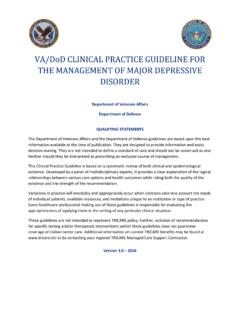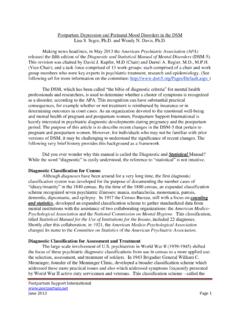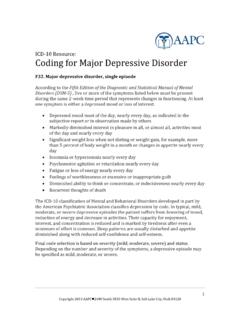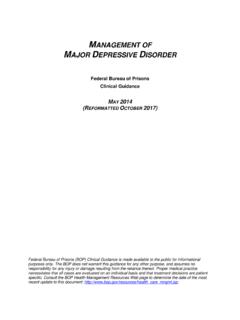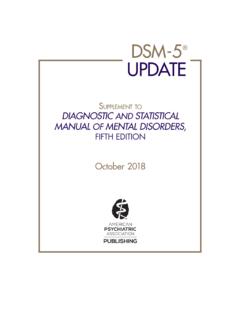Depressive episode
Found 8 free book(s)Persistent Depressive Disorder (Dysthymia) 300.4 (F34.1)
images.pearsonclinical.comWith persistent major depressive episode: Full criteria for a major depressive episode have been met throughout the preceding 2-year period. With intermittent major depressive episodes, with current episode: Full criteria for a major depressive episode are currently met, but there have been periods of at least 8 weeks in at least the
MAJOR DEPRESSIVE DISORDER: TREATMENT PLAN
smarthwc.comall depressive symptoms under control as quickly as possible. Achieving only partial improvement is associated with a higher incident of relapse, poorer quality of life, and adverse health outcomes. Most patients will need a comprehensive treatment plan to achieve remission (the resolution of all or most symptoms) of their depressive episode.
VA/DoD Major Depressive Disorder Clinical Practice …
www.healthquality.va.gov7% of the population —had at least one major depressive episode in the past year. Women are 70% more likely than men to experience depression, and young adults aged 18–25 are 60% more likely to have depression than people aged 50 or older.[3] Depressive disorders often start at a young age; they
Statistical - Postpartum
www.postpartum.netattempts. To count toward a Major Depressive Episode symptoms must either be newly present or must have clearly worsened compared with the person’s pre-episode status. The symptoms must persist for most of the day nearly every day for at least 2 consecutive weeks. The episode must be accompanied by clinically
ICD‐10 Resource: Coding for Major Depressive Disorder
www.hamiltonhealth.comF32.4 Major depressive disorder, single episode, in partial remission F32.5 Major depressive disorder, single episode, in full remission F33 Major depressive disorder, recurrent A recurrent depressive disorder is characterized by repeated episodes of depression without any history of independent episodes of mood elevation and increased energy ...
Management of Major Depressive Disorder
www.bop.govdeveloped major depressive disorder can evolve subacutely over days to weeks, or more slowly after a prodromal period of anxiety and mild depression that lasts for weeks to months. Between 50–85% of persons with a single episode of major depressive disorder will suffer another episode during their lifetime.
Regulations and Documentation Templates Guidance
www.omh.ny.gov821 Major Depressive Disorders & Other Psychoses 822 Disorders of Personality & Impulse Control 823 Bipolar Disorders 824 Depression Except Major Depressive Disorder ... episode of illness, or within 365 days of the last provided service. Notes: …
DSM-5 UPDATE
dsm.psychiatryonline.orgBipolar I Disorder, Current or most recent episode hypomanic [effective October 1, 2015] In partial remission . In full remission . Depressive Disorders .....3 7 . Disruptive Mood Dysregulation Disorder [effective October 1, 2016]


